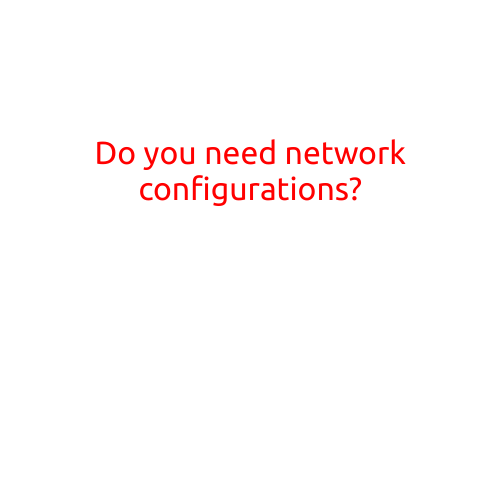
Do You Need Network Configurations?
In today’s interconnected world, having a robust network infrastructure is crucial for both personal and professional purposes. With the increasing dependence on the internet and digital communication, network configurations have become an essential aspect of modern life. But, what exactly are network configurations, and when do you need them?
What are Network Configurations?
Network configurations refer to the setup and organization of a computer network, including the devices, protocols, and procedures required to connect and communicate with other devices on the network. These configurations involve settings such as IP addresses, subnet masks, default gateways, DNS servers, and other parameters that enable devices to exchange data.
When Do You Need Network Configurations?
You may need network configurations in various situations, including:
- Setting up a home network: If you have multiple devices at home, such as computers, smartphones, and smart TVs, you may need to set up a network to share files, print documents, or stream media.
- Business network setup: A company with multiple employees and devices requires a robust network infrastructure to facilitate communication, collaboration, and data sharing.
- Gaming and online multiplayer: Online gaming requires a stable and fast network connection, which may involve configuring network settings to optimize performance.
- Security and troubleshooting: Network configurations can help you troubleshoot connectivity issues, monitor network traffic, and implement security measures to prevent cyber threats.
- Device compatibility: Network configurations can ensure compatibility between different devices, such as computers, smartphones, and tablets, and make it easier to share files and data.
Benefits of Network Configurations
Having a well-configured network offers numerous benefits, including:
- Improved connectivity: A well-configured network ensures seamless connectivity between devices, reducing latency and ensures a stable connection.
- Enhanced security: Network configurations can help prevent cyber threats by implementing robust security measures, such as firewalls, intrusion detection systems, and encryption.
- Increased productivity: A well-configured network enables employees to work efficiently, share files, and collaborate remotely.
- Better performance: Optimized network configurations can improve network performance, reducing lag, and ensuring faster data transfer.
Conclusion
Network configurations play a vital role in modern life, whether you’re a home user, business professional, or gamer. By understanding the importance of network configurations, you can ensure a stable, secure, and efficient network connection. If you’re unsure about your network configuration or require assistance, consider consulting a network expert or using online resources to help you set up and optimize your network.





